Rio 2016 Olympics: Is golf out before it's back in?
- Published
- comments
I may not watch Olympic golf - McIlroy
Rory McIlroy says he probably won't even watch television coverage of golf at this summer's Olympic Games, preferring "track and field, swimming, diving, the stuff that matters".
The sport is returning to the Olympic roster for the first time in 112 years but is doing so without many of its top players.
There will be no Jason Day, no Jordan Spieth, no Rory McIlroy and no Dustin Johnson - the world's top four players - when the Games begin in less than a month's time.
It means the blurb on the official Rio 2016 website - "the lure of a gold medal is sure to attract the sport's biggest names " - is both out of date and - maybe to some - a little embarrassing.
BBC Sport examines whether golf's Olympic future now hangs in the balance.
Who has pulled out and why?
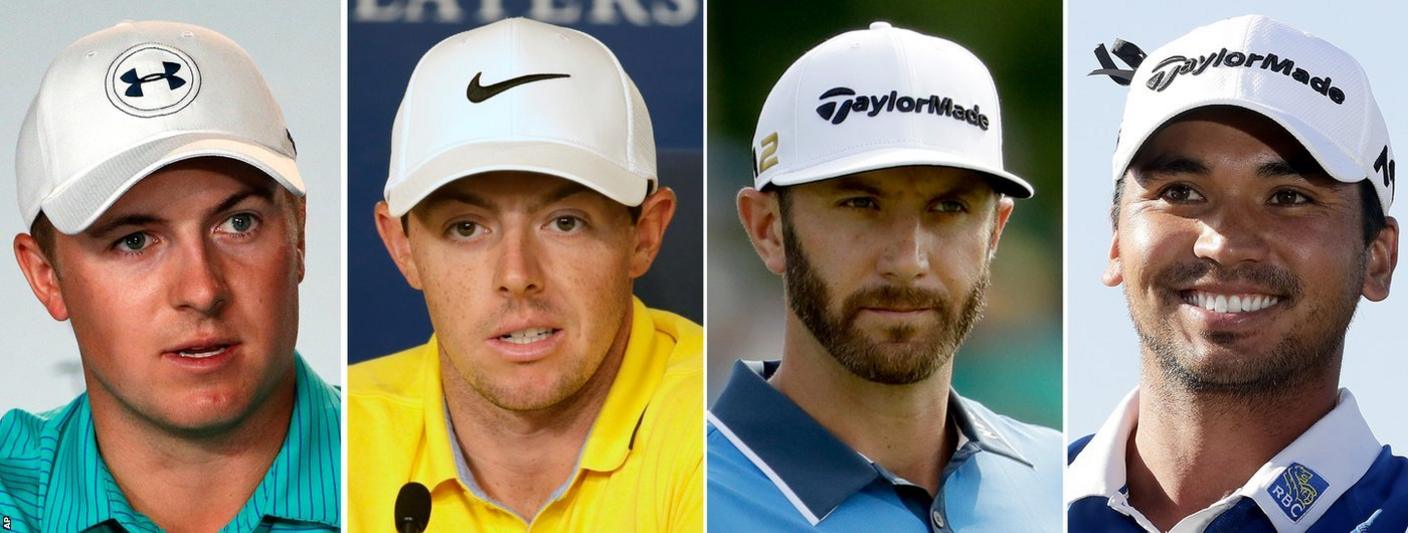
All four top male players have withdrawn - but just one female golfer has pulled out owing to health concerns
The top four golfers in the world in Day, Johnson, Spieth and McIlroy. In fact, only four of the top 10 say they will be in Rio.
McIlroy, who has four majors to his name, was the first of the big names to withdraw. The Northern Irishman seemed set on playing in Rio but then changed his mind, citing the threat of the Zika virus as the reason for his decision, external and adding he would have another chance to experience the Games in 2020. "I'm more than happy to wait until then to get that Olympic experience," he said.
He subsequently made it clear the Olympics were not high on his agenda. Nor was the idea of helping the game of golf grow.
Australian Day and American duo Spieth and Johnson also blamed their withdrawals on the mosquito-borne Zika virus, which has been linked to brain defects in newborn babies.
Australian Adam Scott will not be in Rio, but the 2013 Masters winner says it is because the Olympics is not as important as other events in the golfing calendar. Indeed, back in 2015 he said the Olympics was "nothing I've ever aspired to do and I don't think I ever will".
He added: "It's all about the four majors and I think that's the way it should stay for golf."
US Open runner-up Shane Lowry, from the Republic of Ireland, and Japan's Hideki Matsuyama also blame Zika for not being in Rio, while South African former Open champion Louis Oosthuizen is absent for family and scheduling reasons.
So far, only one female golfer has pulled out, with South Africa's Lee-Anne Pace blaming the Zika virus.
Rose wants 'unique' Olympic gold
Is Zika a genuine worry?
The World Health Organisation (WHO) has declared it as a "public health emergency of international concern", putting it in the same category of importance as Ebola. It is also said there is a strong scientific consensus that Zika can also cause Guillain-Barre, a rare neurological syndrome that causes temporary paralysis in adults.
Zika has been linked to thousands of babies being born with underdeveloped brains. Deaths are rare, but there is no vaccine or medication to stop it. The only way to avoid catching it is to avoid getting bitten by the mosquitoes that transmit the infection.
There will be fewer mosquitoes around when the Olympics take place because the climate is cooler. Average temperatures in Rio in August are 22C, compared with 27C in February, the hottest month.
Dr Bruce Aylward, the WHO's executive director for outbreaks and health emergencies, told BBC Sport the risk of catching Zika was "very low" in August. He added Olympians can lower the risk further by staying in air-conditioned rooms and using repellent and protective clothing. However, golfers will be more exposed than most given they are competing outdoors for several hours a day and on a course partly built on a nature reserve.
International Golf Federation (IGF) president Peter Dawson thinks there has been an "overreaction" to the threat of Zika but understands why some golfers have pulled out. "I think there is a genuine concern about this, not just amongst the players but among their families, their wives and their girlfriends," he said.
The danger to unborn babies or those looking to start or build a family is real, according to Professor Sam McConkey, head of the department of international health and tropical medicine at the Royal College of Surgeons in Dublin. "Anybody who is considering conceiving a child in the next six to 12 months shouldn't be travelling voluntarily to Brazil," he said.
New York University professor Lee Igel has called on the Games to be postponed because of Zika and told BBC World Service Sport he believes the WHO is using "convenient information" to play down the threat.
"Golfers and any other athletes who are pulling out deserve some sympathy," he added. "Zika isn't just a convenient excuse, there's a host of health reasons to be concerned about.
"There's a lot about the Zika virus - in particular the strain in Brazil - that's behaving in a way which is different from other places. It's evolving. There's got to be more investigation into how this virus behaves."
So why are golfers getting flak?
Sir Steve Redgrave calm about Zika threat
It is the men who are coming in for most of the criticism, mainly because of the number of high-profile names pulling out.
Some critics believe golfers are not being as up front as Scott has been about their reasons for pulling out and are using the Zika virus as a convenient excuse for not going to Rio. That is certainly the view of British former rower Sir Steve Redgrave, who won five Olympic gold medals between 1984 and 2004.
Irish boxer Katie Taylor, who won Olympic gold in London, criticised Day on social media when he announced he was not going to the Games,, external tweeting: "More chance of him getting killed by a spider in Australia than getting infected by the Zika virus."
Lydia Ko, the women's world number one golfer, says she has spoken to other female players and claims the general feeling is it is important for them to be in Rio. "I'm more excited about the Olympics, about the ceremony, about just being in that Olympic vibe than worrying about the Zika virus," said the 19-year-old New Zealander. "We're all excited to go to Brazil, represent our countries and be there amongst the other Olympians."
There is also resentment from other sports - including squash, which lost out to golf in the fight for Olympic recognition in 2009. Laura Massaro and Nick Matthew, both squash world champions, say Olympic gold should be the pinnacle for any athlete whose sport is part of the Olympic programme and believe the International Olympic Committee got it wrong by allowing golf back in after a 112-year absence. "In hindsight, it was not the cleverest decision," Massaro told BBC Sport.
Why do the Olympics lack appeal?
Scott has been clear about his reasons for bypassing Rio, insisting he has other priorities. He wants to spend time with his young family as well as focus on the two major championships - the Open Championship, external and the US PGA Championship - that precede the Olympics, as well as the lucrative FedExCup play-offs that follow it.
McIlroy subsequently admitted the four majors are more important to him than the Olympics. "We dream of winning Claret Jugs and we dream of winning Green Jackets," he said.
It is not just about the majors either. The next few weeks are a busy time for the world's top players. The Open and US PGA are being held in July, while the Olympic golf tournament takes place at exactly the same time as the John Deere Classic, which has total prize money of £3.73m, including a winner's cheque of £650,000, and offers valuable world ranking points.
There will be no prize money or points on offer in Rio - only the lure of an Olympic gold medal. "I don't know if golf has its place in the Olympics now," conceded 2015 Open champion Zach Johnson. "Golf fans really look forward to the majors and the Ryder Cup in particular. I know, as a player, those are my main motivations."
Australian duo Scott and Day will not be at the Ryder Cup at the end of September but the two Johnsons could be, as will Spieth and McIlroy for what will be a highly anticipated clash between the best golfers in the United States and Europe.
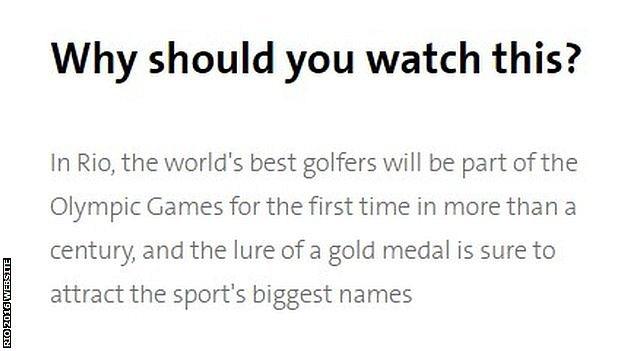
The Rio 2016 website boasts of what golf's participation will bring to the Olympic Games
Does Olympic golf need time to bed in?
Tiger Woods, Jack Nicklaus, Phil Mickelson and Padraig Harrington spoke out on golf's behalf when it was seeking Olympic inclusion in 2009. "It's win-win for both sides," insisted 14-time major winner Woods at the time. "Golf is such a global sport. I couldn't think of a better sport to be part of the Olympic Games."
Harrington added: "I do believe in time the Olympic gold will become the most important event in golf and I don't believe it will take that long."
How long? It is worth looking at what happened to tennis when it was readmitted to the Games in 1988. Back then, the Czech Republic's Miloslav Mecir took gold in Seoul as just three of the world's top 10 took part. By London 2012, an injured Rafael Nadal was the only missing player from the world's elite.
Former British number one tennis player Tim Henman, who played in three Olympic Games and won silver at Atlanta 1996, told BBC Sport golf will need to be patient, too.
"When tennis was a recognised Olympic sport, the feeling wasn't particularly strong," he said. "But fast forward 30 years and tennis is right up there in terms of the stature of the event. It has evolved and golf will take time to evolve."
That said, Henman, who is now retired, revealed he would have chosen winning a Grand Slam over Olympic gold.
What about the golfers who are going?
"I am 100% in," said American two-time Masters winner Bubba Watson, who, as it stands, is the top-ranked golfer heading for Rio. He added the only way he would not compete was if he failed to make the team or if he was stopped by the US government, the International Olympic Committee (IOC) or "a bad car wreck".
It is worth noting Watson and his wife cannot have children, so Zika is less of a worry for him - but his enthusiasm shines through.
English duo Danny Willett and Justin Rose are also going. Willett, a surprise Masters winner this year, says he wants more children with his wife but is happy to compete in Rio. Rose says he is looking forward to "walking around with the team tracksuit on" and feeling "part of something bigger than just golf".
Sergio Garcia said there were "some dangers" but the opportunity to represent Spain, become Olympic champion and help grow golf are "too important".
Sweden's Henrik Stenson also intends to be in Rio. "I'm not afraid of mosquitoes, I'm more afraid of bears," he said.
"I have a few nice trophies at home and it would be nice to hang an Olympic medal next to them. I think that would look kind of cool."
Top Chinese golfer Shanshan Feng is also competing in Brazil, trusting science and technology to keep her safe. "This is my first Olympic Games and might be my last - so this is my only chance," she said.
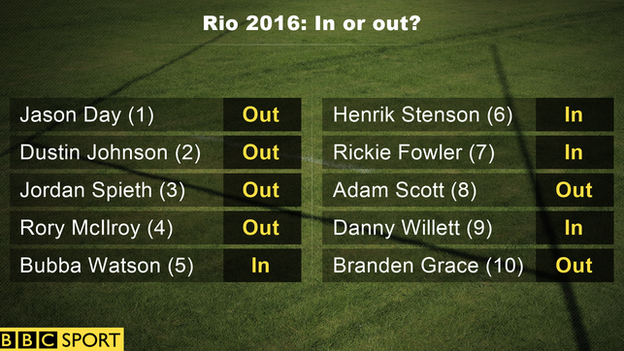
So what about golf's long-term Olympic future?
As it stands, golf will be part of the 2020 Games in Tokyo. Beyond that, who knows?
Matthew thinks golf is in danger of blowing a golden opportunity and says the IOC "should be held responsible" for "undermining the basis of the Olympic Games". He said it "belittles" the Olympics if gold "isn't the pinnacle", adding: "I certainly think the Olympic ideals and image have been confused a little bit over the last decade or so."
Massaro echoes that view. "When golf was included in the Olympics, all the top players pledged to play it and gave the impression it would be a priority for them," she said.
The IGF's Dawson, who championed golf's return to the Olympics, concedes golf is in a tricky spot. "There is no doubt the number of withdrawals hasn't shown golf in the best light and we have to accept that," he said.
"What I'm hoping is that when we come to play in Tokyo in 2020 that the top players do support Olympic golf. I think it's very important that they do. It's the biggest grow-the-game opportunity available and I can't think of a better way for players to give back to the game, frankly, than to support Olympic golf."
However, McIlroy said: "I'm very happy with the decision I've made. I have no regrets about it. I'll probably watch the Olympics, but I'm not sure golf will be one of the events I'll watch."
Asked what he might watch, he replied: "Track and field, swimming, diving, the stuff that matters."
Colin Montgomerie, who backed golf's inclusion in the Games, fears for the sport's Olympic future. "Am I worried? Very much so," said the Scot. "If I was in charge of the IOC, of course I'd have a second look at it."
Massaro thinks golf is at risk, adding: "Maybe they will get one more chance at 2020. If it is the same again, then probably it will get pulled."
International Olympic Committee president Thomas Bach, when questioned about golfers withdrawing from Rio, has always pointed to the WHO advice, perhaps suggesting the players should not be pulling out.
"It is obvious this does not help the attractiveness of the golf competition," he said.
The IOC will decide which sports will feature at the 2020 Games in mid-2017.
- Published12 July 2016
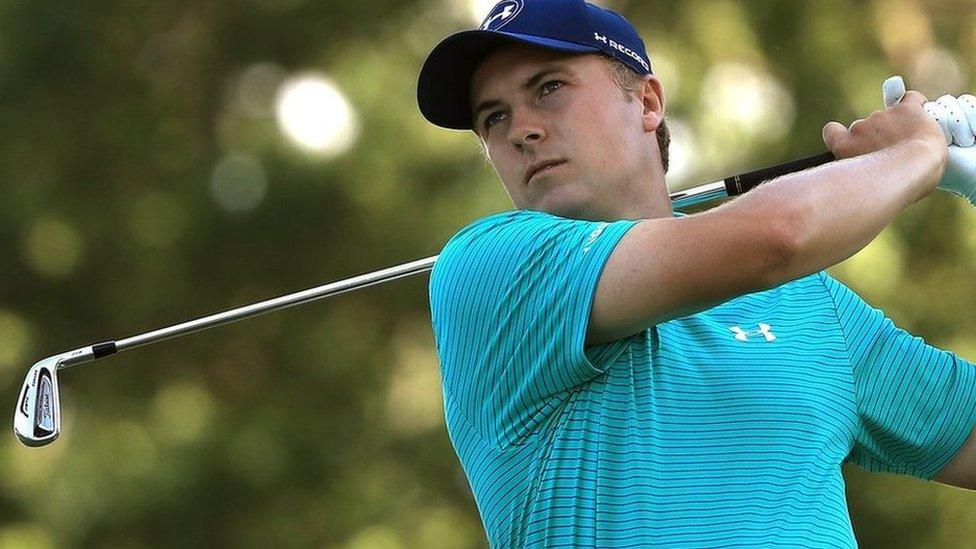
- Attribution
- Published31 August 2016

- Published28 September 2018
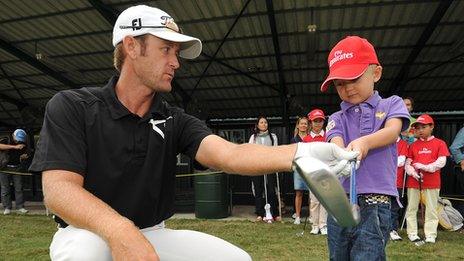
- Published8 August 2017

- Published19 July 2016
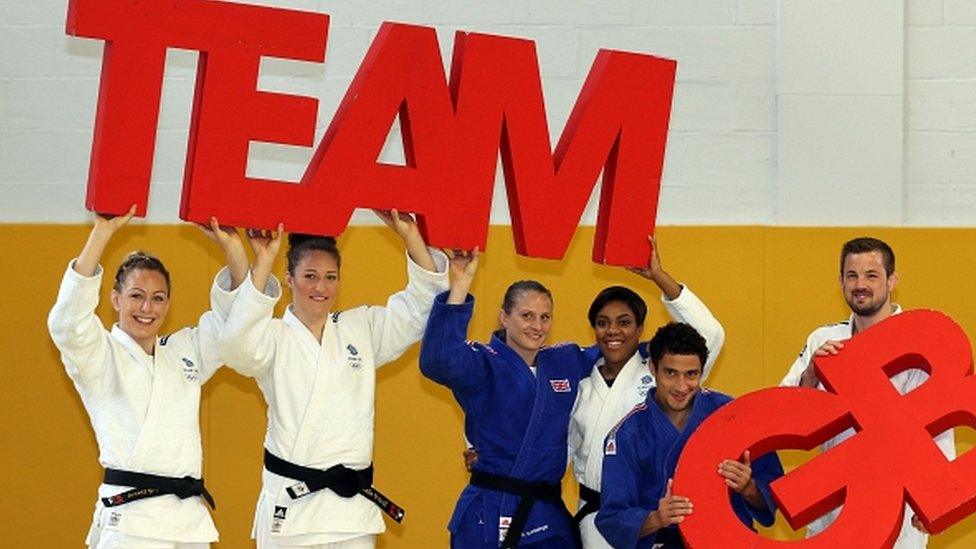
- Published13 May 2016

- Published19 July 2016
